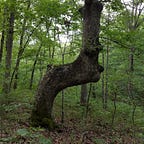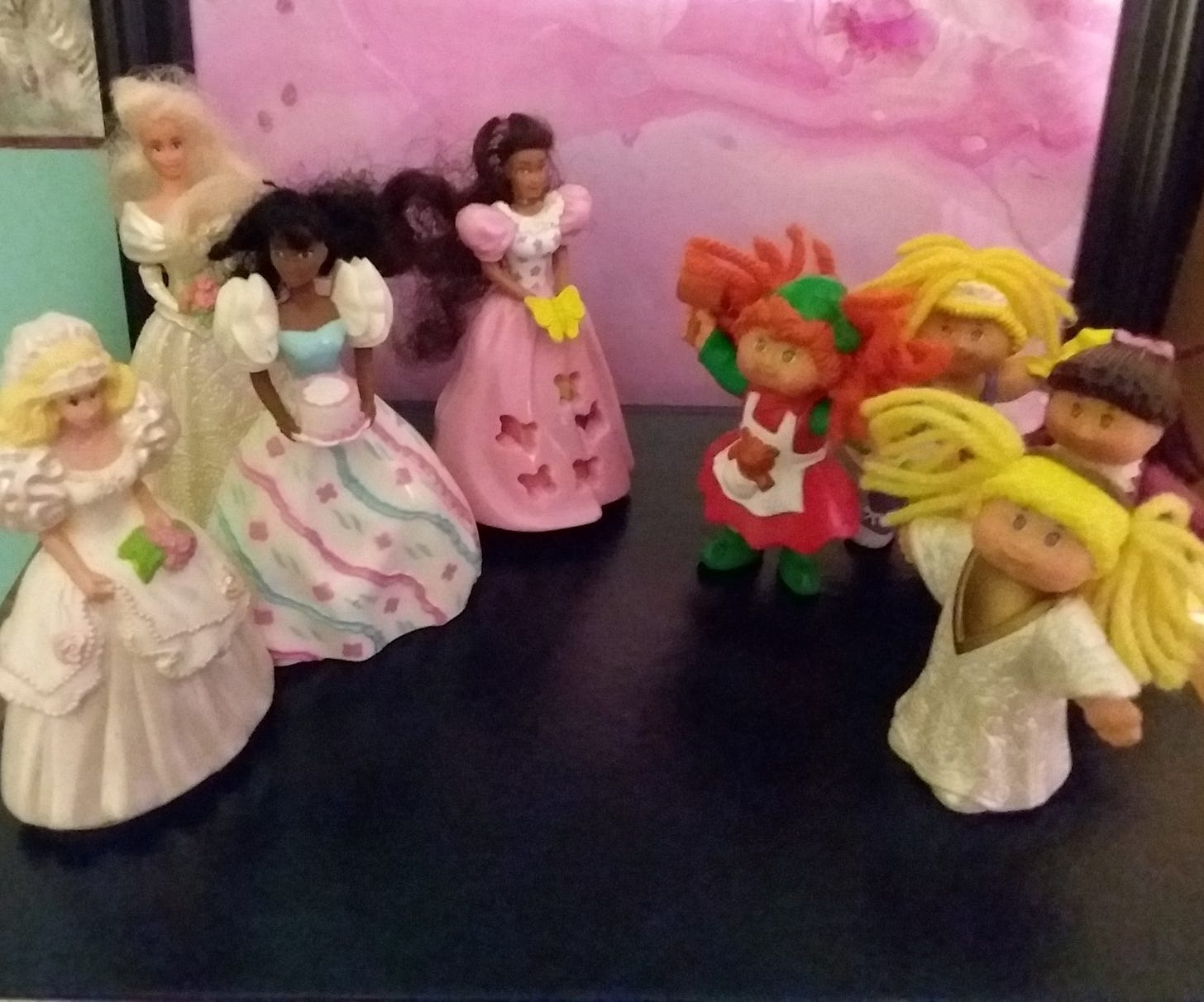Since early childhood, humans are taught to sort. Objects sharing a common property are divided into groups, such as color or shape. The most rudimentary of sorting is a dichotomy, forming two groups. The human mind categorizes things, people, or events into two clusters. Of the various ways of dichotomizing such as big/little, hot/cold, and hard/soft, the most common bifurcation is good/bad. When people are divided into “good” and “bad,” with the latter viewed as the enemy, the real enemy might be the division.
Note about the image: Do you focus on the differences between the figures on the left and the right or the shared characteristics for all of them?
My Mysterious Mind
I just finished reading The Coddling of the American Mind by Lukianoff and Haidt (2018). They identified and described three trends destroying our younger generation of adults and teens. The first trend focused on equating safety with not being exposed to uncomfortable ideas or words. I addressed this in my post Antifragility. Next, the shift to trusting one’s feelings was the focus (albeit not explicitly stated) in my message about Feelings. In this message, I concentrate on the problems caused by viewing the world through the lens of good and bad people.
Human beings are naturally tribalist, seeking the protection of a group of trusted others. Social psychologists have studied this tendency, which is also found in many animals. Dichotomous thinking of “us” versus “other” is the primitive inclination for classifying trusted members of one’s own tribe apart from unknown members of other tribes, who might be dangerous. Division is a part of our drive to survive.
The default tendency of tribalism is to view someone unfamiliar as a potential threat. When someone unknown becomes familiar, the sense of danger is diminished. Team-building activities wisely start with just having strangers in a group get to know each other. Sharing information such as hobbies, favorite foods, and pets increases familiarity and builds the foundation of trust. Having led groups of adults through this initial trust-building process, I am amazed at how much it improves a sense of community and fights a sense of division and isolation.
Without familiarity, mistrust often fills the void between strangers. Even couples who spend too little time just talking with each other will find they “grow apart.” When familiarity diminishes, so does the bond of trust. Differences, always present, become unreconcilable.
Lukianoff and Haidt (2018) described the increase in tribalism of political parties in the United States. The divide between political parties has been growing wider since about 1999, with the most dramatic widening happening since 2004 (see p. 128 of Lukianoff & Haidt). Prior to this increasing division, partisanship was driven by affinity for one’s own party. In recent years, a sense of negative partisanship has become more prevalent, which is political participation motivated by hatred towards the other party or its candidates. Difference has degenerated into distrust and even hostility. And one of the most influential factors has been separate streams of media for each side of the political aisle. Members of one tribe become increasingly familiar with “their” side and gain a more biased view of the “other” side.
No matter what your political leaning, you are probably concerned about the upcoming elections and the potential aftermath. I know I am. Despite the portrayal of the “other” side’s candidates as the enemy, the real enemy is the level of division between citizens of the same country. The different perspectives, always present between parties, demand loyalty to one’s side, resisting any openness to finding common ground. Shared citizenship has degenerated into identity politics. The more “we” degenerates into “us” versus “them,” the greater the risk to us all.
Message of Mystery Acres
The forest shows us two forms of division, one multiplies life, the other destroys it. Dividing seeds from a source plant allows the plant to multiply across a larger area. Similarly, dividing bulbs allow the plant to multiply and spread. In the animal world, conception prompts many rounds of division to grow offspring. Once ready to live independently, these young will divide from their parents and start a new cycle of multiplication through mating. In these ways, division brings more life, multiplying it.
The other type of division brings destruction and even death. When a part of something alive is divided from its source of life, death follows. A branch broken from a tree will become brown and lifeless. A leg severed from the body will not survive, though a one-legged body might live. In the worst form of division, beheading, neither head nor body will live through the separation.
Mystery Acres demonstrates life-multiplying division more than death-bringing. There are lifeless branches, but they are usually dead of natural causes and then dropped by the tree. Wildflowers appear in seemingly random places, somehow divided from the others. The wet-weather creek is divided into contributing inlets, merging into deeper channels as it travels downstream. There are no tribal feuds in the forest. Despite the diversity, the forest thrives as an inclusive whole.
The message of Mystery Acres is one of dividing only to multiply, to increase life, not weaken it. Nature favors multiplication over division.
Ancient Mystery’s Voice
God said, “Multiply” (see Genesis 1:28)
I like math; I even minored in math as an undergraduate. Addition, subtraction, multiplication, and division were perfect and predictable. The right answer was always the right answer. As I pondered division, I began to wonder about God’s attitude towards math.
Which brought to mind funerals and the line: “the Lord gives, and the Lord takes away.” Oh! That sounds like addition and subtraction. Then I thought about God’s command to Adam and Eve, way back in the book of Genesis. God told them to multiply. I wondered, what does God think about division? For those of you who are math-phobic, don’t worry: I’m not going to explore God’s view of algebra or calculus.
Given the way our Creator uses division to multiply life, as demonstrated by the forest, I think He likely prefers multiplication to division. Aside from the use of division to expand life, does God ever prefer division on its own? If God is the source of wisdom, are there situations where division is wise?
After a cursory survey of ancient Biblical stories, I concluded that division can be good, even in its destructive version. When Cain murdered Abel, God divided Cain from his family, sending him away. This probably spared Cain from retaliation. At the Tower of Babel, as the people grew too focused on building a tower of glory for themselves, God divided them through the creation of different languages (see Genesis 11:9). Though the initial division probably destroyed friendships, maybe even families, it eventually caused the multiplication of nations.
There are other examples of division in the words of Ancient Mystery. When directing the Israelites as to which animals to eat, God told them not to eat those with divided hooves (Leviticus 11:3). Then, in one of the more recent writings (Titus 3:10-11) believers are advised to separate a divisive person from their community after unsuccessfully warning him or her to stop causing trouble. In this situation, divisiveness is bad and requires division to solve the problem. There are also several instances of dividing land to bring peace between family groups and dividing possessions amongst people to provide fairness.
Aside from these limited examples, it seems to me that God prefers multiplication to division. He directed the first humans to multiply and, when giving directions to His followers, Jesus described the multiplication of seeds from a fruitful harvest (See Mark 4:8). Spreading good news was compared to sowing seeds, some of which would multiply a hundredfold.
Do you remember math word problems? Solving the problem requires identifying the relevant numbers and choosing the correct approach, such as addition, subtraction, division, or multiplication. From the words of Ancient Mystery, I sense a caution against using division. Choosing to multiply might bring a better solution.
Living in Mystery
What does it mean to live in the mystery of recognizing when division is the enemy? First, it requires facing our natural tendency to divide into groups, especially groups of people with whom we are most familiar, labeling one group as “good” and the other as “bad.” With this realization, we also need to work against pre-judging a member of an “other” group without knowing them. Instead of assuming the worst about someone, let’s restore the use of giving someone the “benefit of the doubt.” Instead of assuming their intentions were bad, we can choose to assume that their intentions were good, even if the outcomes were not. How about we start with the foundation of believing actions are driven by the best of intentions? I admit this is hard for me in certain situations, especially some political agendas of the “other” party. It may look like what they are doing is going to destroy the country, but I doubt that is their intention.
Next, we need to emphasize our common humanity identity instead of our differing ones (see Lukianoff & Haidt, 2018). Political division can multiple constructive dialogue BUT only with respect and an eye to shared humanity and a goal of good for all. When sporting teams play hard but fair, the outcome is a good game, despite having one winner and one loser. Healthy debate between opposing viewpoints multiplies understanding of the complexity of an issue. It’s good to disagree and even better when those disagreements aren’t demeaning. Hate someone’s ideas if you must but try really hard not to hate the person expressing those ideas. See a critique of your ideas as just that, not a personal attack.
As an old mom to young parents, think about the message you give your children about strangers. When I grew up the advice was to not get into cars with strangers. But I have often heard today’s parents tell their children not to talk to strangers. Do you see the shift and how it preserves mistrust? Encourage your children to talk to strangers, to learn about people from different viewpoints and cultures. Most people, no matter their identity affiliations, love their families and are trying to make the world a better place. Their logic and methods might seem illogical and wrong but teach your children to focus on the similarities connecting humans, instead of the differences that divide us. This isn’t a Pollyanna view of a Kumbaya world. Elevate the value of shared humanity while acknowledging critical differences in worldviews.
And no matter the outcome of the 2024 elections, remember that some very important things remain the same. The people who voted did so with good intentions, even if we disagree with the outcomes. No matter who lives in the White House, God still rules on His throne. Despite any heated reactions publicized in the media, we each have family and friends who love us. And the forest will be the same on the day after the elections.
Connecting with Mystery
Dear Lord of All Mystery, it is uncomfortable to ponder the division in our shared country. I confess to thinking the worst of people with whom I disagree, especially in political viewpoints. Help me to remember the principle of the benefit of the doubt, assuming that people have good intentions even if the outcomes look bad to me. Instead of focusing on identities that divide us, show me the ways in which our shared humanity unites us. Help me to use multiplication to increase the ways in which we are connected to each other and to You. Amen.
Notes from Dr. Mac
If you want to do your own investigation of any of the scriptures I use, I suggest you go to Bible Gateway. This free online version of the Bible allows a search of words or phrases in various translations. You might find it interesting, as I did, to use the word divide or multiply as a search term and see ancient uses of these words.
You can find previous posts of my work at my ARCHIVE and organized compilations in the My Books section. You can also find Mystery’s Voice on Spotify.
I want to know what you’re thinking! You can email me at: Dear Dr. Mac or leave/send a message (see below). I love hearing from you!












